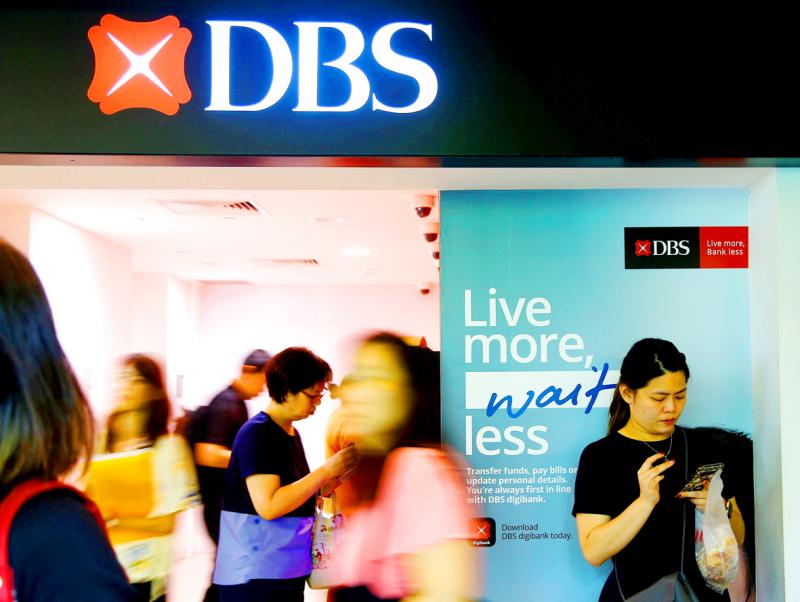Wealthy people in Asia are readying cash to take advantage of opportunities in financial markets and private equity once the COVID-19 pandemic subsides, the head of private banking at Southeast Asia’s largest lender said in an interview this week.
Clients have increased cash holdings to about 40 percent of their portfolios in recent months, up from about 30 percent before the pandemic, said Joseph Poon, who leads DBS Group Holdings Ltd’s Private Bank unit.
While the unit does not disclose assets under management, it is part of DBS Group’s S$251 billion (US$184 billion) wider wealth platform, which is among the largest in Asia.

Photo: Reuters
“Clients are holding a lot more cash than usual. It’s a very interesting phenomenon,” Poon said.
“Ultra-high-net-worth clients believe there will be a good opportunity in the marketplace once the pandemic impacts have flown through the economy,” he said, referring to those with at least S$30 million in investable assets.
Clients are considering financial assets, e-commerce and logistics businesses with funding gaps, he said. Some plan to use the cash for their own business needs and might use it to expand companies through partners.
Poon’s insights mirror a wider trend.
Data compiled by Bloomberg showed that leading private equity firms are sitting on about US$1.6 trillion of dry powder after the pandemic halted private equity deals and roiled global markets.
Still, holding on to cash might mean that some investors have already missed a massive market rally, with the MSCI AC Asia Pacific Index surging about 43 percent since its March low.
New assets inflows — or net new money — at DBS Private Bank and another one of its wealth businesses more than doubled to S$5 billion in the first half, Poon said.
The funds came from a range of destinations, including family offices in the US, Europe and elsewhere that see Singapore as “a strong jurisdiction,” he said.
DBS Private Bank, which accepts clients with at least S$5 million in investable assets, is part of DBS Group’s wider wealth platform, which reported that assets grew 7 percent at the end of June from a year earlier.
DBS Group expects assets under management to grow at a similar rate this year, Poon said.
Elsewhere in the region, DBS Group is on track to double the wealth assets at its Thai brokerage unit to S$8 billion by 2023.
The bank has seen rich Thais looking at private banking products in Singapore as they hunt for global investments, Poon said.
It is also looking to expand in the Philippines, where it only has a representative office, Poon said, without giving more details.
“We kicked off some discussions last year and are still in the midst of structuring the best way to tap on the growing onshore high-net-worth individuals’ increasing investment appetite,” Poon said. “Still, it’s early days.”

Intel Corp chief executive officer Lip-Bu Tan (陳立武) is expected to meet with Taiwanese suppliers next month in conjunction with the opening of the Computex Taipei trade show, supply chain sources said on Monday. The visit, the first for Tan to Taiwan since assuming his new post last month, would be aimed at enhancing Intel’s ties with suppliers in Taiwan as he attempts to help turn around the struggling US chipmaker, the sources said. Tan is to hold a banquet to celebrate Intel’s 40-year presence in Taiwan before Computex opens on May 20 and invite dozens of Taiwanese suppliers to exchange views

Application-specific integrated circuit designer Faraday Technology Corp (智原) yesterday said that although revenue this quarter would decline 30 percent from last quarter, it retained its full-year forecast of revenue growth of 100 percent. The company attributed the quarterly drop to a slowdown in customers’ production of chips using Faraday’s advanced packaging technology. The company is still confident about its revenue growth this year, given its strong “design-win” — or the projects it won to help customers design their chips, Faraday president Steve Wang (王國雍) told an online earnings conference. “The design-win this year is better than we expected. We believe we will win

Chizuko Kimura has become the first female sushi chef in the world to win a Michelin star, fulfilling a promise she made to her dying husband to continue his legacy. The 54-year-old Japanese chef regained the Michelin star her late husband, Shunei Kimura, won three years ago for their Sushi Shunei restaurant in Paris. For Shunei Kimura, the star was a dream come true. However, the joy was short-lived. He died from cancer just three months later in June 2022. He was 65. The following year, the restaurant in the heart of Montmartre lost its star rating. Chizuko Kimura insisted that the new star is still down

While China’s leaders use their economic and political might to fight US President Donald Trump’s trade war “to the end,” its army of social media soldiers are embarking on a more humorous campaign online. Trump’s tariff blitz has seen Washington and Beijing impose eye-watering duties on imports from the other, fanning a standoff between the economic superpowers that has sparked global recession fears and sent markets into a tailspin. Trump says his policy is a response to years of being “ripped off” by other countries and aims to bring manufacturing to the US, forcing companies to employ US workers. However, China’s online warriors